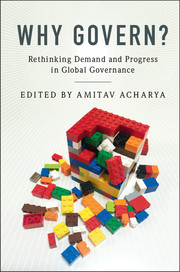Book contents
- Frontmatter
- Contents
- List of Figures
- List of Tables
- Notes on Contributors
- Acknowledgments
- List of Abbreviations
- 1 Rethinking Demand, Purpose and Progress in Global Governance: An Introduction
- Part I The Changing Concept of Global Governance
- Part II Issue Areas
- 5 Conflicts and Security
- 6 Human Rights
- 7 Atrocity Crimes
- 8 Trade
- 9 Finance
- 10 Climate
- 11 Refugees
- 12 Health
- 13 Cyberspace and Social Media
- 14 The Contested Quest for Global Governance: Conclusions and Directions for Further Research
- Bibliography
- Index
7 - Atrocity Crimes
from Part II - Issue Areas
Published online by Cambridge University Press: 05 September 2016
- Frontmatter
- Contents
- List of Figures
- List of Tables
- Notes on Contributors
- Acknowledgments
- List of Abbreviations
- 1 Rethinking Demand, Purpose and Progress in Global Governance: An Introduction
- Part I The Changing Concept of Global Governance
- Part II Issue Areas
- 5 Conflicts and Security
- 6 Human Rights
- 7 Atrocity Crimes
- 8 Trade
- 9 Finance
- 10 Climate
- 11 Refugees
- 12 Health
- 13 Cyberspace and Social Media
- 14 The Contested Quest for Global Governance: Conclusions and Directions for Further Research
- Bibliography
- Index
Summary
In this chapter, global governance is understood to mean the management of transnational issues by states, international institutions, social movements, and other relevant public and private actors through norms, laws and policies. For the issue area covered in this chapter, the normative shifts have been the most significant changes in global governance, with flow-on implications for operational, institutional and compliance elements. The focus of analysis therefore is primarily on the normative structure of the global governance of civilian atrocities.
The origins of the Westphalian sovereign state lie in the effort to limit uncontrolled domestic armed violence. Faced with internal anarchy and large-scale lawlessness, the state was granted a monopoly on the legitimate use of force as the solution to the problem of internal violence. In a matching vein, as competing outside powers intervened on opposite sides in internal power struggles, external state sovereignty and the doctrine of nonintervention as its logical corollary were seen as the solution to the problem of international violence and anarchy (despite many breaches of the norm in practice). This still leaves the question of what to do about the excessive use of force by states within their own borders.
This chapter first describes the new norms of international criminal justice and the responsibility to protect (R2P) as a two-part answer to the question. It then takes up the key questions addressed in this project overall: What were the main sources of demand for the norms? Were the primary motivations normative, strategic, functional or a mixture of the three? Is there any evidence of agents from the global South being among the norm entrepreneurs? And what might be the way forward for the consolidation of the norms as part of the architecture of global governance? Because of the exceptionally tight space restrictions, I will focus relatively more on R2P.
Twin Norms: Duty to Prosecute and Responsibility to Protect
Large numbers of civilians are killed in armed conflict from direct violence and through “excess deaths” caused by conflict-related hunger and disease. Revulsion at the murder of large numbers of civilians killed in a range of atrocity crimes has led to a softening of public and governmental support for the norms and institutions that prevent international assistance to protect the victims and shield the perpetrators from international criminal accountability.
- Type
- Chapter
- Information
- Why Govern?Rethinking Demand and Progress in Global Governance, pp. 138 - 156Publisher: Cambridge University PressPrint publication year: 2016
- 2
- Cited by



